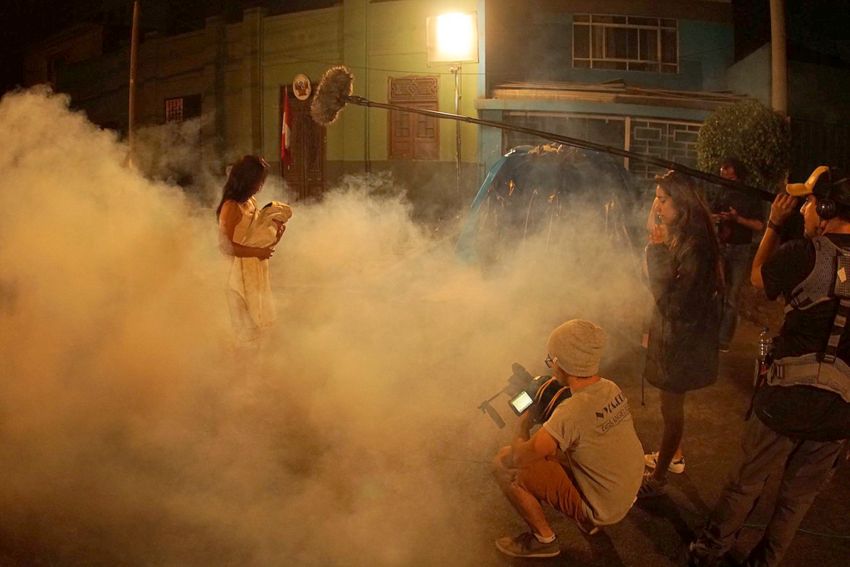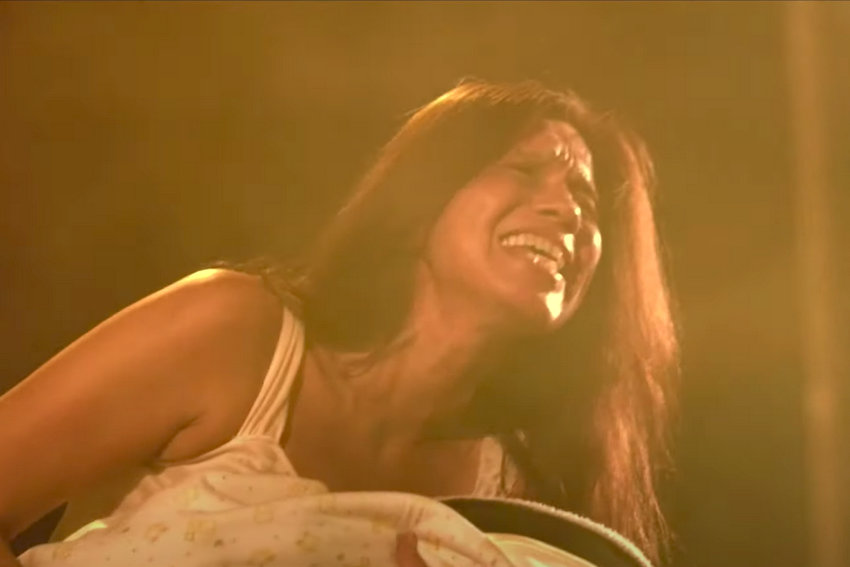
I wrote this story because I was moved by a scene I saw from the explosion in Tarata in 1992. There was this scene where you could see a father trying to get into a building on fire. People asked him what was going on and he replied in desperation that his son was upstairs. This moved me so much that got me writing a script based on that guy for my film but from another perspective. I think I was sad and felt impotence with that I saw and that was something that moved me along the whole production of my film.
indieactivity: Did you start writing with a cast (You or any) in mind?
Nicole Campbell Fierro (NCF): I didn’t start writing with a cast in mind but I had visual images in my mind of who I was basing my characters in. The main character was based on my father. My father is a person who is reserved and serious but will go crazy for their kids. I always remember this time I went to France for 1 month to study abroad and he got super skinny because of how worried he was. I wanted to create a character like him. Someone who will kill and die for their kids.
How long did you take to complete the script? (Do you have a writing process?)
Nicole Campbell Fierro (NCF): this is a placeholder text, that indicates that the content for this template must be placed between this block, to allow the article to hold a firm structure and also kill time for the writer or editor.
Watch the full version of the film Shinning Ashes directed by Nicole Campbell Fierro
This is a placeholder text, for the interview question?
Nicole Campbell Fierro (NCF): I wrote it in two semesters while studying at The New York Film Academy. I started with the treatment and worked on it for a whole semester and at the end of it wrote my first draft which I was able to read to my classmates. After that I dedicated myself to rewriting the story a lot of times until I was satisfied and passionate about it.
When did you form your production company – and what was the motivation for its formation?
Nicole Campbell Fierro (NCF): I formed my production company just the year I finished my bachelor degree studies. I knew I was going to be alone in the world and that I had to start creating my own material and expanding.
What was the first project out of the gate?
Nicole Campbell Fierro (NCF): I’ve had a lot of projects but wasn’t confident enough to show them publicly because I wasn’t that happy with them.

During production, what scene (that made the cut) was the hardest to shoot?
Nicole Campbell Fierro (NCF): The most difficult scene was the car bomb explosion. We had some problems with permits and we had to close the street. Another thing we had to have in mind was coordination between a bigger number of actors which my AD helped me with and the coordination of lights, follow focus and more. It was the most emotional scene of the movie and we needed everyone to be professional. My crew was really helpful and patient and I’m happy with the results.
What works better in this latest production that mightn’t have worked so well in the last one you did?
NCF: The amount of time I got to prepare for it and getting to know exactly what I wanted to transmit. I was passionate about the idea which pushed me to give my best. The pre production was really important for this one which sometimes lacked in other productions I had made.
You produced and directed the film, what measure of input did it take to don these hats?
NCF: I directed the film and did some producing stuff but I wouldn’t say I was the producer. Paulo, my line producer, was the one in charge of looking for locations, finding the actors and crew members. My mother, who was the executive producer, was the one who focused on the contracts and closing deals. She used to ask about it with me but I was just supervising for stuff to be done how I had been taught in my film school.

Is there anything about the independent filmmaking business you still struggle with?
NCF: Getting the money I guess. Most of my projects have been self-financed therefore I haven’t been exposed to getting the investors that want to help my projects develop.
Where do you think your strengths lie as a filmmaker?
NCF: I’m patient and detail oriented. Everyone can be all stressed focusing on the work but I’m silently looking from outside trying to think how to solve stuff. I like noticing those small things people usually are too busy to see.
Let’s talk about finance. How did you finance the film?
NCF: Like I mentioned before, It was self financed.
How much did you go over budget? How did you manage it?
NCF: We went 1500 over budget but we were able to manage it. I had some crew problems where I had to increase the pay to some of them and some permit situations. Overall, my family was supportive and therefore they helped us manage it.
Irvine International Film Festival: Shining Ashes
How important is marketing? Do you think a project can make any dent without it these days?
NCF: It’s very important. Because my film was about something linked to a real event, there were a lot of victims or families of victims who were moved by it. They got interested in it and I still receive emails from them asking when they will be able to see them in their states or countries. I tried to post the best I could, use hashtags and comment on posts that were similar to mine so it could make them gain interest in it. I have to admit that this was one of my favorite parts of the process.
Can you tell us about your marketing activities on the project – and how it’s gone for you?
NCF: I moved the marketing mostly from instagram. I found out people were more responsive and active around there. They liked, commented, asked because they had been interested on the political event that happened some years ago. I did some Facebook and YouTube. But that wasn’t that effective. I did a lot of commenting in pages that talked about the Shining Path and invited them to watch my film. I got a lot of loyal fans like that.
What do you hope audiences get from your film?
NCF: I have two things that I want the audience to get from this. The first one is that I want Peruvians to remember what the Shining Path did to us in the past and avoid them from rising again from the VRAEM where they are still operating and that violence is never the way out.

What else have you got in the works?
NCF: Right now I’m working on a similar topic. I’m writing a feature about these two kids that get kidnapped in the VRAEM by members of the Shining Path and how their lives are affected by it.
Tell us what you think of the interview with Nicole Campbell. What do you think of it? What ideas did you get? Do you have any suggestions? Or did it help you? Let’s have your comments below and/or on Facebook or Twitter.
Follow Nicole Campbell on Social Media
Website
IMDb
LinkedIn
Instagram
YouTube
MORE STORIES FOR YOU
Richard Green Documentary, ‘I Know Catherine, The Log Lady’: Premiere in NYC, LA May 9th
Lynchian Doc I Know Catherine, The Log Lady Makes Hollywood Premiere 4/17, Rollout to Follow
In Camera by Naqqash Khlalid Launch on VOD April 29
Naqqash Khlalid’s Directs Nabhan Rizwan. In Camera stars an EE BAFTA Rising Star Award Nominee.
2025 Philip K. Dick Sci-Fi Film Festival Award Winners Announced
Vanessa Ly’s Memories of the Future Awarded Best PKD Feature
Dreaming of You by Jack McCafferty Debuts VOD & DVD for April Release
Freestyle Acquires “Dreaming of You” for April 15th Release
Hello Stranger by Paul Raschid set for London Games Festival & BIFFF
The film Is set for an April 10th Premiere at The Genesis Cinema in London (LGF) and BIFFF
Daydreamers Official Trailer by Timothy Linh Bui: Released by Dark Star Pictures
Daydreamers Vietnamese Vampire Thriller – May 2nd release









